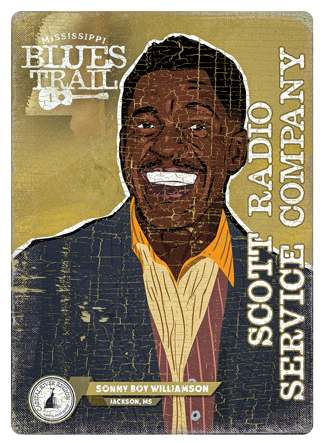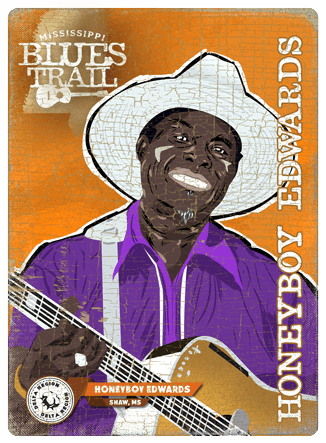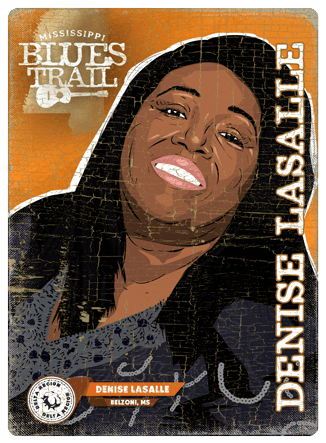Acclaimed as a founder of rock ‘n’ roll, Bo Diddley (Ellas Bates McDaniel) was born near Magnolia, south of McComb, on December 30, 1928. Diddley wrote and recorded such hits as “I’m a Man,” “Bo Diddley,” “Say Man,” and “Road Runner.” The distinctive rhythm of his “Bo Diddley” beat and his pioneering use of electronic distortion were widely influential. His songs have been covered by Buddy Holly, the Rolling Stones, The Who, Eric Clapton, and many others.
Bo Diddley, one of the most unconventional yet influential figures in the history of American popular music, lived his early years in Pike and Amite counties. According to the 1930 census, his name as a two-year-old was Ellis [sic] Landry; his mother, Ethel Wilson, was living at the time with her cousin, Eugene Bates (the man Diddley believed to be his father). Diddley used the surname Bates until his mother’s cousin Gussie McDaniel began raising him. In McComb the McDaniel family lived on Carver Street, near Highway 51; they moved to Chicago in the mid-1930s. There Diddley took up the violin, and at age twelve received his first guitar. His unique approach to guitar, he recalled, stemmed largely from his attempts to imitate the sound of a bow on a violin. As a teen he began playing for tips on the streets and eventually in clubs with groups that included blues recording artists Jody Williams and Billy Boy Arnold. To achieve his own sound Diddley rebuilt guitar amplifiers and constructed a tremolo unit out of a clock spring and automobile parts, and enhanced the group’s rhythm by adding maracas and drums.
In 1955 Diddley made his first single for Chicago’s Checker Records. Both sides were hits: I’m A Man was a bold declaration of pride at a time when many whites referred to an African American man derogatorily as “boy,” and was covered by Muddy Waters as Mannish Boy, while the flip side, Bo Diddley, spotlighted his trademark beat, which was similar to a traditional African American slapping rhythm known as “hambone.” Diddley said he traced his variation back to Pentecostal church services, and his younger brother, the Reverend Kenneth Haynes, recalled Bo singing the rhythm as a child. The name “Bo Diddley” was used by various black vaudeville performers prior to his birth, and was suggested as a more colorful stage name than Ellas McDaniel when he recorded.
Diddley, Fats Domino, Little Richard and Chuck Berry were among the few African American artists to achieve crossover stardom in the 1950s rock’n’ roll market, and many bands adopted Diddley’s songs and beat. Diddley’s guitar sound became p art of the basic vocabulary of rock, influencing guitarists including Link Wray, Jimi Hendrix, Led Zeppelin’s Jimmy Page, and the Who’s Pete Townsend, while his later funk recordings have been sampled by hip hop artists such as De la Soul and Method Man.
A member of both the Blues and Rock and Roll Halls of Fame, Diddley received Lifetime Achievement Awards from the Rhythm & Blues Foundation and the National Academy of Recording Arts & Sciences, as well as a Mississippi Governor’s Award for Excellence in the Arts. He died at his home in Archer, Florida, on June 2, 2008.


